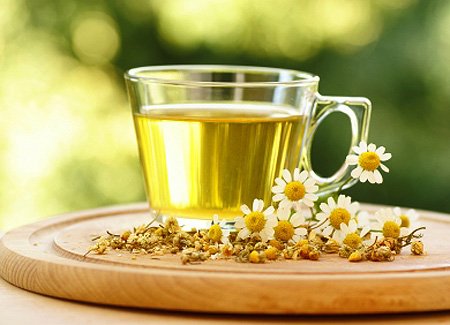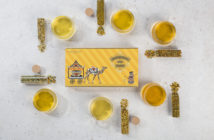Herbal tea that can calm, soothe and relax has great value in today’s often hectic world. So, select one of these special calming herbal teas, sit back, and relax.
The general rule is to use one teaspoon of dried herb or 3 tablespoons of fresh crushed herb per cup of boiling water. Pour boiling water over the herb leaves or flowers and steep for 5 to 10 minutes. (5 minutes is sufficient in most cases. Overlong steeping can ruin a delicate flavor.) Many of these herbal teas can also be drunk cold or made into iced teas. Keep in mind that although the general rule given applies to most teas, certain herbs have different preparation methods and steeping times. Chamomile, linden and hops flowers should not be allowed to steep more than 3 to 4 minutes. Dried herbs for herbal tea should be kept in airtight containers that do not allow light to enter.
Chamomile – Chamaemelum nobile (Roman) and Matricaria chamomilla (German)
Roman and German chamomiles have similar appearance and uses. To produce this aromatic, wheat herbal tea only the fresh or dried flowers are used. The tea has a soothing and mildly sedative effect which helps us to relax after or even during a hectic day or as an aid for a good night’s sleep. Chamomile is safe to use, even for children. For total relaxation why not try a cup of chamomile tea while lingering in a warm and soothing chamomile bath?
Lemon Balm- Melissa officinalis
This is a refreshing, anytime herbal tea that should be tried by everyone for its calming effects. It is special in that it soothes the entire nervous system, yet stimulates the heart at the same time. Lemon balm leaves and flowers can be steeped a bit longer, up to 15 minutes, to release more of its lemony flavor. Serve hot or cold. This herbal tea will also help you to get a good night’s sleep and even helps soothe a headache.
Download our free Wellness & Tea 101 E-Book
Catnip – Nepeta cataria
Yes, catnip is the plant with leaves that cats find intoxicating and thoroughly relish. Not too many realize that catnip also provides us with a tasty, aromatic and refreshing herbal tea. The tea is both soothing and mildly stimulating at the same time. It makes a perfect nightcap, easing restlessness and nervousness. This woodsy-tasting herbal tea is also mildly stimulating and often taken as a tonic.
Linden – Tilia x europea
Linden tea is very popular in parts of Europe for its lightly floral scent and pleasantly sweet flavor. In several regions, an herbal tea of the flowers and leaves is an old household remedy for nervousness, anxiety, insomnia, headaches and indigestion. It has also been suggested as a useful remedy or aid for high blood pressure and palpitations.
American Passionflower – Passiflora incarnata
A mild sedative, this particular species of passionflower provides a vegetal-tasting tea that calms nervousness and anxiety and helps you get to sleep at night. It is generally considered safe to use, but should be avoided by pregnant women.
Motherwort – Leonurus cardiaca
Motherwort produces another herbal tea that can calm the nervous system. It is commonly used for nervous heart problems and palpitations. As the common name indicates, the plant is especially valuable for certain women’s conditions such as PMS, menstrual pain and delayed menstruation. The taste may be bitter so many add sugar, lemon, or honey to improve the flavor. Again, it is not safe for pregnangy and nursing women.
Valerian – Valerian officinalis
Primarily associated with its sedative action, valerian has a calming effect on the whole nervous system and has been used to treat insomnia. Caution: Though the earthy herbal tea that valerian produces has strong calming effects, do not make your herbal tea too strong or take in excess, as too much has the potential to cause lethargy, head pains and other symptoms. Use with discretion.
Blue Vervain – Verbena hastate and Vervain – V. officinalis
Blue vervain in particular has a tranquilizing effect that has proven useful to calm several nervous conditions and alleviate insomnia. V. officinalis is also useful in these areas, though to a lesser degree. The herbal tea is slightly bitter tasting, so you may want to add honey. Once again do not make this herbal tea too strong, take in excess, consume over a prolonged period of time, or use while pregnant.
Disclaimer: These products have not been evaluated by the U.S. Food and Drug Administration. These products are not intended to diagnose, treat, cure or prevent any disease.




